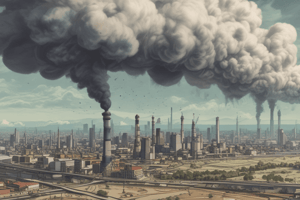Podcast
Questions and Answers
Which of the following is NOT a health risk associated with air pollution?
Which of the following is NOT a health risk associated with air pollution?
- Neurological disorders
- Asthma
- Heart disease
- Diabetes (correct)
What is one of the major sources of air pollution mentioned in the article?
What is one of the major sources of air pollution mentioned in the article?
- Water pollution
- Vehicle emissions (correct)
- Deforestation
- Industrial waste dumping
Which group of people is particularly vulnerable to the harmful effects of air pollution?
Which group of people is particularly vulnerable to the harmful effects of air pollution?
- Teenagers
- Athletes
- Office workers
- Elderly individuals (correct)
How does air pollution impact ecosystems according to the article?
How does air pollution impact ecosystems according to the article?
What measures does the article suggest for mitigating the impact of air pollution?
What measures does the article suggest for mitigating the impact of air pollution?
How do vehicle emissions contribute to air pollution?
How do vehicle emissions contribute to air pollution?
What are some toxic compounds released by industrial activities contributing to air pollution?
What are some toxic compounds released by industrial activities contributing to air pollution?
How can individuals help reduce air pollution at a personal level?
How can individuals help reduce air pollution at a personal level?
What environmental impact does air pollution have?
What environmental impact does air pollution have?
Which of the following is a natural contributor to air pollution?
Which of the following is a natural contributor to air pollution?
What role does agriculture play in contributing to air pollution?
What role does agriculture play in contributing to air pollution?
How can governments help prevent air pollution on a larger scale?
How can governments help prevent air pollution on a larger scale?
Flashcards are hidden until you start studying
Study Notes
Air Pollution: A Serious Health Risk and Environmental Concern
Air pollution is a serious issue with far-reaching consequences. From its negative impacts on human health to the damage it causes to our planet's ecosystems, air pollution demands attention and action. This article will explore the various aspects of this complex problem, including the health hazards associated with exposure to polluted air, the diverse sources from which these pollutants come, and measures we can implement to mitigate their impact.
Effects on Human Health
Breathing clean air is essential for maintaining good health. However, when the quality of the air we breathe deteriorates due to pollution, several adverse health effects can occur. Some of the most notable health risks associated with air pollution include respiratory problems such as asthma and bronchitis, cardiovascular issues like heart disease and stroke, neurological disorders, and even premature death. Children, elderly individuals, and people with pre-existing medical conditions are particularly vulnerable to the harmful effects of air pollution.
Sources of Pollution
Multiple factors contribute to air pollution. One major source is vehicle emissions, including gases like carbon monoxide and particulate matter, which are released into the atmosphere by cars, trucks, buses, and other forms of transportation. Industrial activities also play a significant role in air pollution, with power plants, factories, and mining operations releasing toxic compounds such as sulfur dioxide, nitrogen oxides, volatile organic compounds, and lead. Other contributors include agriculture, where ammonia from animal waste and fertilizers contributes to the problem, and natural processes like wildfires, dust storms, and volcanic eruptions.
Prevention Methods
Preventing air pollution requires a multifaceted approach that involves addressing both individual behaviors and broader policy changes. At the personal level, using public transport instead of driving alone, carpooling, walking, or cycling can significantly reduce your carbon footprint and improve air quality. Choosing energy-efficient appliances and reducing energy consumption can also help lower greenhouse gas emissions. On a larger scale, governments can pass legislation regulating industrial emissions, promoting the use of clean energy sources like wind and solar power, and investing in infrastructure that promotes sustainable transportation.
Environmental Impact
Air pollution not only affects human health but also has significant environmental consequences. It contributes to climate change by trapping heat in the atmosphere, leading to global temperature increases and more frequent extreme weather events. Pollution can also damage ecosystems, harming plants, animals, and microorganisms, disrupting food chains, and altering natural habitats. The air quality index measures how much ground-level ozone and particulate matter are present in the air we breathe, providing a way to assess the severity of these problems.
In conclusion, addressing air pollution requires active engagement from all sectors of society, including individuals, businesses, and governments. By understanding the sources of pollution and implementing effective prevention methods, we can work towards a cleaner, healthier environment for ourselves and future generations.
Studying That Suits You
Use AI to generate personalized quizzes and flashcards to suit your learning preferences.




